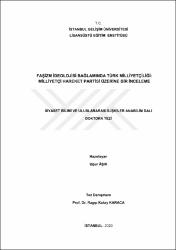| dc.contributor.author | Âşık, Uğur | |
| dc.date.accessioned | 2020-11-08T17:27:01Z | |
| dc.date.available | 2020-11-08T17:27:01Z | |
| dc.date.issued | 2020 | en_US |
| dc.identifier.uri | https://hdl.handle.net/11363/2470 | |
| dc.description | Danışman: PROF. DR. RAGIP KUTAY KARACA
Yer Bilgisi: İstanbul Gelişim Üniversitesi / Lisansüstü Eğitim Enstitüsü / Siyaset Bilimi ve Uluslararası İlişkiler Anabilim Dalı
Konu: Siyasal Bilimler = Political Science | en_US |
| dc.description.abstract | Bireylerin mensubu oldukları topluma karşı duydukları bağlılık ve aidiyet duygusunun temel kaynağı kabul edilen milliyetçilik, çoğunlukla ırkçılık, faşizm, etnikçilik gibi söylemlerle bir arada anılsa da gerek günümüz gerekse eski toplumların en belirgin sosyolojik gerçeğidir. Milliyetçilik daha çok birleştirici ve aynı zamanda eşitlikçi yanıyla ırkçı anlayıştan tamamen ayrılmaktadır. Irkçılık daha çok biyolojik benzerlikler ve bir diğerinin üzerinde üstünlük anlayışı üzerine kurulan bir söylem olması yönüyle milliyetçilik ile bağdaştırılamaz. Başka bir ifadeyle ırkçılık milletlerin kendinden olmayana düşmanca duygu beslemesidir. Faşizm ise daha çok seçkinliğe dayanmakta ve hatta şiddetle bütünleşmesi ile halkın iradesinden daha çok, siyasi iktidarın öncelikli olarak mutlak hâkimiyeti ve devletin üstünlüğüne atıf yapmakta ve halkın iradesi yok sayılmaktadır. Faşizm ve milliyetçilik kavramlarının ikisinde de milli birlik ve beraberlik anlayışı vurgulansa da, faşizm millet iradesinden daha çok otoriter bir anlayışın baskısı altında iktidarın kayıtsız şartsız egemenliği olarak gerçekleşmekte ve millet için devlet değil devlet için millet anlayışı baskın gelmektedir. Çalışmamız beş bölümden oluşmaktadır. Çalışmamızda öncelikle faşizm ve milliyetçiliğin tanımları üzerinde durulmuş, Türk milliyetçiliğinin faşizmden farklı ve benzer yönleri ortaya konulmaya çalışılmıştır. Çalışmamızda ayrıca Türk siyasetinde milliyetçi kimliği ile kendine yer bulan Milliyetçi Hareket Partisi'nin faşist bir parti olup olmadığı, günümüz Türkiye'sinin Türk Milliyetçiliği ve Milliyetçi Hareket Partisine bakışı; Türkiye'nin genel nüfusu, sosyolojik, etnik ve siyasi yapısı dikkate alınarak yapılan saha çalışması ile belirlenmeye çalışılmıştır. Çalışmamızın ana temelini teşkil eden Türk milliyetçiliği ise, Osmanlı İmparatorluğu'nun dağılma döneminde ortaya çıkmış olması ile yenilikçi, toplumun birlikte yaşamaktan doğan dayanışma duygusuna olan yaklaşımı ile de ilkçi bir nitelik taşımaktadır. Çalışmada görülebileceği gibi, Türkiye'de ve dünyada Türk milliyetçiliğini faşizm tanımlaması ile bütünleştirme eğilimi genellikle, sol düşüncenin etkisi altında ortaya çıkmış ve kapsamlı bir değerlendirmeden ziyade faşizmin aşırı milliyetçi yönü üzerinden yürütülmüştür. Dolayısıyla sol düşüncenin tarihsel ve ideolojik karşıtı konumunda bulunan Türk milliyetçiliğine yönelik faşizm iddiası, Milliyetçi Hareket Partisi kadroları tarafından kesin bir şekilde reddedilmiştir. MHP milliyetçiliğini faşist olarak nitelendiren yaklaşımların bir diğer önemli argümanı ise partinin anti-komünist eksenidir. Ancak komünizm karşıtlığı ile faşizm arasında paralellik kurmak zordur. | en_US |
| dc.description.abstract | Nationalism is considered as the main source of the sense of loyalty and belonging to the society and it is the most prominent sociological fact of both today and since ancient societies, although it is often associated with discourses such as racism, fascism and ethnicism. Nationalism differs completely from racist understanding with its more unifying and at the same time egalitarian. Racism cannot be incompatible with nationalism in that it is a discourse based on biological similarities and superiority over another. In other words, racism is that nations have hostile emotions to those who are not. Fascism, on the other hand, relies more on exclusivity and even refers to the absolute domination of the political power and the supremacy of the state and the will of the people, rather than the people's will, with its violent integration. Although the concept of national unity and solidarity is emphasized in both of the concepts of fascism and Nationalism; fascism takes place as an unconditional sovereignty of the government under the pressure of an authoritarian understanding rather than the will of the nation, and the understanding of the nation for the state prevails not for the state. Our study consists of five chapters. In first chapter, the definitions of fascism and nationalism were emphasized, and different and similar aspects of Turkish nationalism from fascism were tried to be revealed. In addition, we will be evaluated that whether Nationalist Action Party is Fascist or not, Turkish Nationalism, National perception to the Nationalist Action Party in respect to survey contains sociological factors such as the general population of Turkey, ethnic and political structure. Turkish nationalism, which constitutes the main basis of our study, is accepted as innovative with the emergence of the Ottoman Empire in the period of disintegration, and it has a primaryist quality with the approach of the society to the sense of solidarity arising from living together. As can be seen in the study, the integration trend in the world of fascism in Turkey and with the Turkish nationalist identification is usually appeared under the influence of leftist ideas and conducted a comprehensive assessment, rather than through the direction of the ultra-nationalist fascism. Therefore, the claim of fascism towards Turkish nationalism, which is in the historical and ideological opposition of leftist thought, was rejected by the staff of the Nationalist Movement Party. Another important argument of the approaches that characterize NAP nationalism as fascist is the party's anti-communist axis. However, it is difficult to establish a parallel between anti-communism and fascism. | en_US |
| dc.language.iso | tur | en_US |
| dc.publisher | İstanbul Gelişim Üniversitesi Lisansüstü Eğitim Enstitüsü | en_US |
| dc.rights | info:eu-repo/semantics/openAccess | en_US |
| dc.rights | Attribution-NonCommercial-NoDerivs 3.0 United States | * |
| dc.rights.uri | http://creativecommons.org/licenses/by-nc-nd/3.0/us/ | * |
| dc.subject | Faşizm | en_US |
| dc.subject | Milliyetçilik | en_US |
| dc.subject | Türk Milliyetçiliği | en_US |
| dc.subject | MHP | en_US |
| dc.subject | Ulus | en_US |
| dc.subject | Ulusçuluk | en_US |
| dc.subject | Fascism | en_US |
| dc.subject | Nationalism | en_US |
| dc.subject | Turkish Nationalism | en_US |
| dc.subject | Nation | en_US |
| dc.title | Faşizm ideolojisi bağlamında Türk milliyetçiliği: Milliyetçi Hareket Partisi üzerine bir inceleme | en_US |
| dc.title.alternative | Turkish nationalism in the context of fascism ideology: A study on the Nationalist Movement Party | en_US |
| dc.type | doctoralThesis | en_US |
| dc.department | Lisansüstü Eğitim Enstitüsü | en_US |
| dc.relation.publicationcategory | Tez | en_US |



















